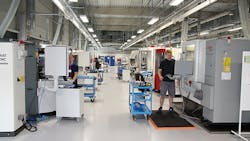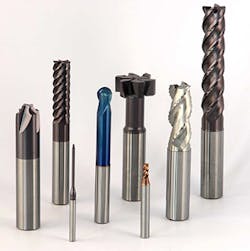Fine Filtration Shows Impact of Advanced Technology in Precision Manufacturing
Every IMTS visitor has a particular agenda – to find new machining or cutting technology, to learn about new programming and automation capabilities — but almost everyone will be seeking to make their current machining operation more effective and efficient. And the performance objectives of machining operations are shared by a good number of IMTS exhibitors too.
Jongen Tool GmbH is a designer and manufacturer of precision cutting tools, tools that meet the industry’s requirements for tolerance, performance, and efficiency — and those objectives can only be produced economically under optimal production conditions. At its new manufacturing plant in Willich, Germany, the technical complexity involved in manufacturing inserts and solid carbide end mills with consistent high quality is full displayed. Among the factors in place to help accomplish all this, Jongen has advanced grinding technology, state-of-the-art measuring and control technology, as well as fine filtration systems by Vomat GmbH.
Jongen has built its reputation on products like the UNI-MILL tools and the recently introduced 428 series tools for aluminum machining in mold making, as well as its new FP T 09 tangential tool for milling corners and planes.
"Jongen is on a focused and healthy expansion path,” according to managing director Günter Hofmann, who heads the design and development programs. In addition to four workshops in Willich, the toolmaker recently brought online a new 15,000-sq.ft. plant, as part of its capacity expansion. The new building incorporates the most up-to-date environmental and workplace technology, with power provided by two block power heating plants that supply electricity and ensure heating and cooling of the halls via heat exchangers.
"Temperature variations are the greatest enemies for reproducible tool quality,” Hoffman explained. “Therefore, our entire production environment from manufacturing to testing and packaging is temperature controlled. We also strive to entirely control our value chain. Therefore, we rely on a high level of vertical integration that allows us to influence all relevant quality parameters in-house.
“For example,” he continued, “we manufacture our own carbide and coat in our own coating machines. For utmost quality, we use only the most modern grinding and measuring technology.”
As a part of this philosophy, the new workshop was outfitted with a state-of-the-art fine filtration system, which is a key element for economical and high-quality tool production.”
To accomplish what they had set out to do, Jongen brought on board Vomat, the specialist in fine filtration systems. Vomat filtration systems are compact design, with a small footprint, with add-on components that allow systems to be customized as standalone units or large, centralized filtration systems. According to the developer, a filtration system can be integrated to fit any customer’s specific workflow.
"Our high expectations combined with our special production needs were setting the bar very high,” Hoffman commented. “Vomat was the only company to guarantee the 'feasibility' of the filtration concept desired by Jongen. Their system provided, among other technical advantages, a small footprint, superior filtration, accurate cooling, as well as energy and recycling solutions that were adapted to our needs.”
Innovative filtration technology
Vomat installed its ZFA 3600 and a ZFA 2400 centralized filtration systems at Jongen. One system provides clean oil for insert production, and the other for tool cutting. The ZFA 2400 has a capacity of approximately 24,000 liters of cooling lubricant and is housed in a separate room, connected to 14 grinding machines.
"Because every little inconsistency in the manufacturing process of cutting tools may have serious consequences for the end result, optimal production conditions are essential to achieve consistent, repeatable quality,” according to Lars Adler, production manager at Vomat.
“Jongen used to have many small standalone filtration units, installed in the immediate vicinity of their grinding machines, throwing off a lot of heat,” Adler recalled. “Today, the heat stays outside the building,” which adds to the available workspace inside the plant, he said.
The systems’ low-maintenance design promotes energy-efficient, full-flow filtration, ensuring that clean and dirty oil are separated with 100% efficiency. High-performance pre-coat filters are designed to extract even the tiniest particles. This allows the filters to maintain NAS 7 quality for a long time, combined with unmatched service life.
Another design advantage is the energy-efficient, on-demand filtration and backflush operation, which is activated only when the contamination level of each filter element is reached. This ensures a continuous clean oil supply and filter elements and grinding oil can remain in the system for a long time.
Apart from the advanced design of the Vomat systems, machine operators also benefit from the highly accurate process control and precise temperature control functions. Grinding oil temperature is maintained in a range of ±0.1 K. This is important for reliable, quality tool production.
"Vomat technology ensures that almost no heat is introduced into the medium,” Lars Adler assured, “so none of the grinding machines’ axes will expand or contract. Even small nuances in expansion or contraction could lead to variations in quality, particularly for smaller sized tools,” he said.
Pre-coat filtration systems don’t require any filtration aids, which usually render the contaminated sludge as un-marketable. The recycling process is fully automatic. The sludge is deposited into a drum, ready to be collected by a recycling company of your choice.
All Vomat systems are PLC-controlled and can be serviced and monitored remotely, via WIFI.
"Jongen has implemented a future-orientated and powerful tool production plan under clean, quiet, and environmentally conscious conditions,” Günter Hofmann stated, “which enables us to continuously grow and fulfill the requirements of our customers."

